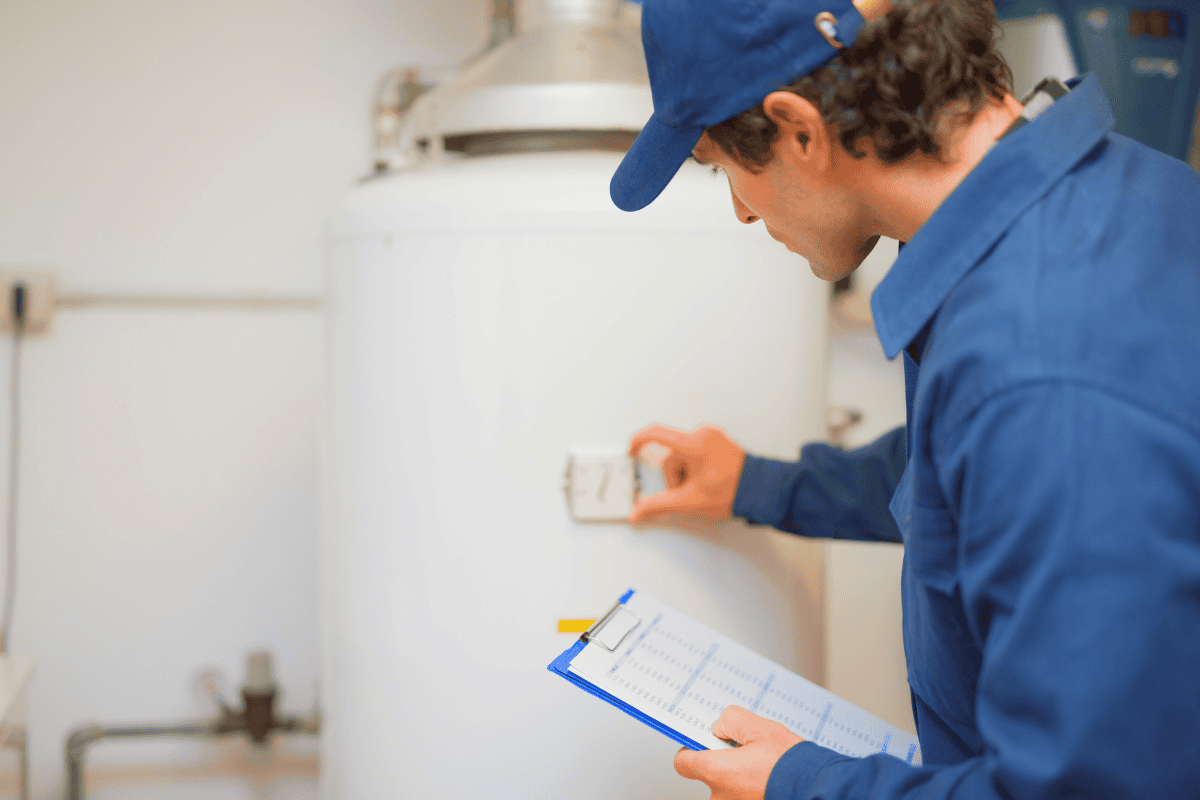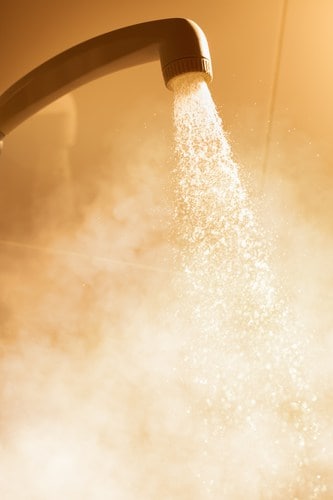Water heater repairs in Winder aren’t always as easy as 1-2-3. And water heater repairs in Winder are probably not on your list of top ten things you’re looking forward to this year. But can you imagine living without hot water? No hot water for showers, hot water for washing dishes, or hot water for doing laundry. We depend entirely on our water heaters for our hot water needs to keep chugging along. It’s funny that we depend on them, yet we hardly give them a second thought. Until they stop working, that is.
So, if you have hot water issues, what can you do? The big question is, can a plumber fix the issues, or will you need to replace the whole tank? That’s where you can rely on the advice from the experts. Water heaters require careful treatment by knowledgeable, licensed, trained technicians. Not only are you dealing with natural gas lines, but you’re also up against many gallons of water, and you don’t want either of those things leaking out.
So, let’s talk about repair vs. replacement. Which problems are repairable? And what issues require a complete water heater replacement? We break it down for you here. Keep reading to learn more.
Problems Water Heater Repair Services Can Fix
 Not Enough Hot Water Issues Can Be Repairable
Not Enough Hot Water Issues Can Be Repairable
Is there ever enough hot water? One of the most common complaints plumbers get regarding water heaters is that the water isn’t hot enough or there just plain isn’t enough. This could be the case for a few reasons, most of which are fixable with small adjustments or repairs. First, the temperature is set too low. A bump to a higher temperature could fix the problem, but beware of setting it too high. Anything above the factory default of 140 degrees could pose a scalding hazard. Another reason for a lack of hot water could be a faulty heating element. Replacing a bad heating element should fix the problem. It could be a faulty temperature gauge if it’s not the heating element. Either of these issues should be relatively simple to repair.
Repair Maintenance May Quiet A Noisy Water Heater
 Your water heater should be relatively quiet. It could indicate sediment buildup if it makes noise when heating the water. The sediment can build up on the heating element and turn to scale, creating a whining noise. If your heater is popping or rumbling, the sediment could have built up on the bottom of the tank. When this happens, the bottom of the tank overheats and causes the water to boil instead of heating to the desired temperature. Regular service, which includes draining the tank annually, can remove the sediment before it builds up inside the tank.
Your water heater should be relatively quiet. It could indicate sediment buildup if it makes noise when heating the water. The sediment can build up on the heating element and turn to scale, creating a whining noise. If your heater is popping or rumbling, the sediment could have built up on the bottom of the tank. When this happens, the bottom of the tank overheats and causes the water to boil instead of heating to the desired temperature. Regular service, which includes draining the tank annually, can remove the sediment before it builds up inside the tank.
Leaking Pressure Relief Valves are Repairable
A pressure relief valve can leak for several reasons. For instance, worn valve seals or sediment buildup, dirt, or debris can prevent its complete closing. Also, excessive system pressure or high water temperature can result in a leaky valve. Improper sizing, inferior installation, or a defective valve may not seat correctly and leak. The repair to solve pressure relief valve problems is to replace the valve by installing a new one.
How much does it cost to fix a water heater?
The cost of fixing a water heater varies, but homeowners typically spend $300 to $600 on water heater repairs. However, costs can go as high as $1,500 for complex issues. Regular maintenance and timely repairs can prevent costly damage and extend your water heater’s life.
| Repair Type | Estimated Cost |
|---|---|
| Thermostat Replacement | $150 – $250 |
| Heating Element Replacement | $200 – $300 |
| Pressure Relief Valve | $100 – $200 |
| Flushing the Tank | $80 – $100 |
Is it worth it to repair a hot water heater?
Whether it’s worth repairing a water heater depends on several factors:
| Factor | Repair It | Replace It |
| Unit Age | Under 10 years old | Over 10 years old |
| Issue Severity | Minor: broken thermostat or valve | Major: leaking tank or visible corrosion |
| Repair Cost | Repair costs are less than 50% of replacement | Repair costs are close to or more than replacement cost |
| Energy Efficiency | Uses less energy and lowers utility bills | Increasing energy usage and higher utility bills |
Problems that Require You to Get a Water Heater Replacement
To Have Enough Hot Water May Require Replacing the Heater
 The lifespan of tank water heaters typically ranges from eight to twelve years. If your unit is approaching this age and you are experiencing problems with inadequate hot water, it may be time to consider replacing it.
The lifespan of tank water heaters typically ranges from eight to twelve years. If your unit is approaching this age and you are experiencing problems with inadequate hot water, it may be time to consider replacing it.
The Water Heater is Undersized for Your Hot Water Demands
Another reason for inadequate hot water is an undersized heater that cannot meet your hot water needs. Your water heater may just be too small. Often, a unit can provide plenty of hot water for many years, but hot water demands can change over time, leaving you with a system that cannot keep up. The only way to increase your hot water is to install a larger replacement to upgrade your old, outdated, too-small system. You can figure out how big your water heater should be at the energy.gov website.
Replace A Noisy Water Heater
As mentioned above, a water heater making noise is sometimes repairable. When the problems that cause water heaters to rumble, knock, and growl are ignored, deterioration worsens, and a replacement is the only solution. If you drain the tank annually to remove sediment, you may add some years to the unit’s life.
However, if you don’t drain the tank annually, or if the buildup continues even with regular maintenance, sediment causes rust and corrosion. Eventually, this will compromise the tank’s structure and require replacing the whole unit.
When You See Rust, Replacement is a Must
Water and steel together can lead to rust. If your water heater gets even the smallest amount of rust inside the tank, it can lead to corrosion. Once your tank starts to corrode, it will turn your water rusty at the tap. While rust isn’t common when a unit is new or only a few years old, it’s inevitable once it ages. Besides the gross rusty water, another problem with rust and corrosion is that it can lead to a leaking tank. A leaking water heater can be a nightmare as it can flood your home with hot water and cause massive water damage.
Leaking Water Heater Tanks Are Replaceable
 Your water heater will experience thousands of cycles of expansion as it works to heat your water over the years. This daily wear and tear on the unit can eventually lead to fractures in the tank. While cracks might be hairline at first and not result in leaks, as fractures worsen, they develop. When this happens, there are no repair options. The only choice is to replace your water heater.
Your water heater will experience thousands of cycles of expansion as it works to heat your water over the years. This daily wear and tear on the unit can eventually lead to fractures in the tank. While cracks might be hairline at first and not result in leaks, as fractures worsen, they develop. When this happens, there are no repair options. The only choice is to replace your water heater.
What is the average cost of water heater installation or repair services?
The water heater installation or repair cost varies based on the type of service, type of water heater, labor fees, and geographic location. Always compare quotes from multiple plumbers to ensure you get the best price.
| Service Type | Estimated Cost |
|---|---|
| Water Heater Repair | $150 – $600 |
| Tank Water Heater Replacement | $500 – $1,500 |
| Tankless Water Heater Installation | $2,000 – $4,500 |
| Heat Pump Water Heater Installation | $1,500 – $3,500 |
| Solar Water Heater Installation | $3,000 – $7,000 |
How long does the installation or repair process usually take?
The time required to install or repair a water heater depends on the type of service. Repairs are usually faster than replacements or installations. Tankless water heaters take longer to install due to additional electrical and plumbing work.
| Service Type | Time Estimate |
|---|---|
| Water Heater Repair | 1 to 3 hours |
| Tank Water Heater Installation | 2 to 4 hours |
| Tankless Water Heater Installation | 4 to 8 hours |
| Heat Pump Water Heater Installation | 3 to 6 hours |
| Solar Water Heater Installation | 1 to 2 days |
What is the normal life expectancy of a water heater?
The average life expectancy of a water heater depends on the type. Signs your water heater may be near the end of its life include rust-colored water, inconsistent hot water supply, strange noises, and visible leaks.
| Type of Water Heater | Average Life Expectancy |
|---|---|
| Tank Water Heater | 8 to 12 years |
| Tankless Water Heater | 20+ years |
| Heat Pump Water Heater | 10 to 15 years |
| Solar Water Heater | 15 to 20 years |
What are the typical signs that indicate a water heater needs repair?
| Warning Sign | Possible Problem |
|---|---|
| No Hot Water | You have no hot water, indicating issues with the heating element or thermostat. |
| Inconsistent Water Temperature | Water temperature fluctuates from hot to cold, signaling a possible thermostat or sediment problem. |
| Strange Noises | Rumbling, banging, or popping from the tank may indicate sediment buildup. |
| Rust-Colored Water | Orange-tinted water can point to internal tank corrosion and rust. |
| Water Leaks | Puddles or moisture around the heater suggest a leaking tank or loose connections. |
| Low Water Pressure | This could indicate mineral buildup or a damaged valve. |
| High Energy Bills | An inefficient water heater may work harder and use more energy, increasing utility bills. |
 When was the last time you tried to go without hot water? If you’re lucky, you haven’t had the pleasure. The truth is, none of us would last very long without this daily necessity. But just like any other household appliance, your water heater is subject to wear and tear that can lead to breakdowns and issues.
When was the last time you tried to go without hot water? If you’re lucky, you haven’t had the pleasure. The truth is, none of us would last very long without this daily necessity. But just like any other household appliance, your water heater is subject to wear and tear that can lead to breakdowns and issues.
Fixing some of these is easy and affordable, and it can be done with simple repairs that a reliable plumber can perform. Some are not an easy fix; in those cases, it’s time to replace your old heater and upgrade to a new one. Whether your system needs repair or replacement, you can count on the professionals at Anthony Wimpey Plumbing for all your water heater repairs in Winder and beyond.
 What to Look for in a New Water Heater Checklist
What to Look for in a New Water Heater Checklist
Has your water heater been letting you down? If your trusted plumbing professional has indicated that repair
isn’t possible and it’s time for a new one, don’t go uninformed. While buying a new water heater might not
be at the top of your spring to-do list, if yours has gone bust, it’s important to know what to look for when
shopping for a replacement. Your plumber can help guide you, but check out our checklist for hot tips.
FAQ About Anthony Wimpey Plumbing Water Heater Services in Winder
What types of water heaters do you install and repair?
At Anthony Wimpey Plumbing, we install and repair many water heaters, including tankless systems, heat pumps, hybrid units, electric water heaters, and gas water heaters. Our skilled plumbers are up on the latest models to ensure your home or business has an efficient hot water system.
Do you offer emergency plumbing services?
Yes, we understand how essential hot water is for your daily needs, so we offer emergency plumbing services. If you’re experiencing an unexpected issue with your water heater, you can trust our 24/7 team to address it promptly and efficiently.
What other plumbing services do you offer?
Beyond water heater services, Anthony Wimpey Plumbing offers plumbing services, including drain cleaning, septic tank maintenance, line installations, and overall plumbing maintenance. Our experienced plumbers provide high-quality services for all your plumbing needs.
Do you offer maintenance services for my water heating system?
Regular maintenance is critical for maximizing the efficiency of your water heating system. We offer maintenance services to keep your heater in top shape and tips for preventing unexpected issues.
Can you help me choose the best water heater for my home?
Our water heater installation services are tailored to meet your needs. We’ll assess your home, discuss your preferences, and recommend the best unit for your household or commercial space. If you’re looking for an eco-friendly option, we can help you choose an efficient tankless water heater or another suitable system.
How do I know if my water heater needs to be repaired or replaced?
If your water heater isn’t delivering hot water consistently, it may need repairs, such as fixing a faulty thermostat or addressing sediment build-up. However, it might be time for a replacement if it frequently needs repairs or is over 10-15 years old. Upgrading to a high-efficiency or tankless water heater uses less energy than older units.
Are your plumbers experienced?
Yes, our plumbers are highly skilled, experienced, and certified. They bring years of expertise to every job, ensuring all installations, repairs, and maintenance tasks are completed to the highest standards.
Do you offer services for commercial water heating systems?
Absolutely. We specialize in both residential and commercial water heating systems. Whether you need a new installation service, routine repairs or replacements, or emergency plumbing services, our team is equipped to handle your commercial water heating needs. We do the job, causing minimal disruption to your business operations.
What areas do you serve?
Anthony Wimpey Plumbing proudly serves Winder and surrounding areas, including Barrow, Gwinnett, Morgan, Rockdale, Newton, and Walton County. Our plumbing services are available in Madison, Covington, Conyers, Monroe, Social Circle, Lawrenceville, Lithonia, Snellville, and places like Loganville, Grayson, Dacula, and Oxford, GA. Our family-owned business values trust, reliability, and excellent customer service, ensuring your plumbing and heating systems remain in perfect condition.
Call to Schedule a Service Appointment
Scheduling a service with us is easy. You can call us at 770-285-8861 to set up an appointment. Our team will work with you to find a convenient time and ensure your water heater or plumbing issues are resolved promptly.
